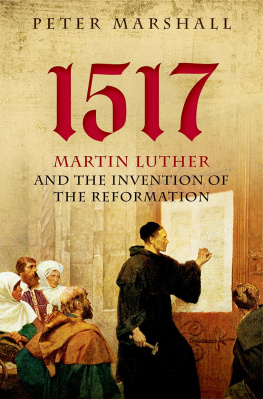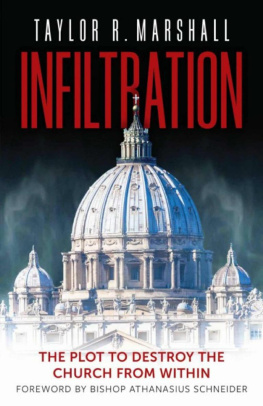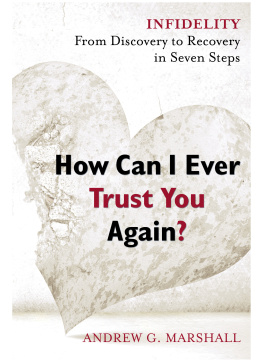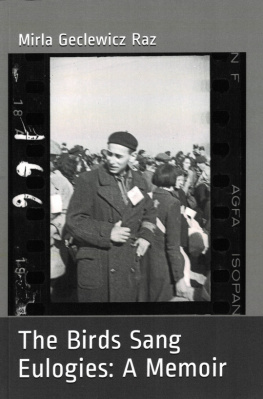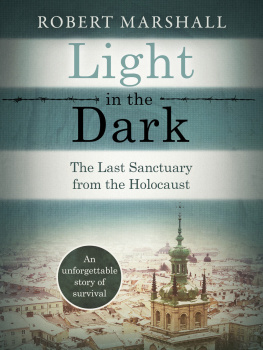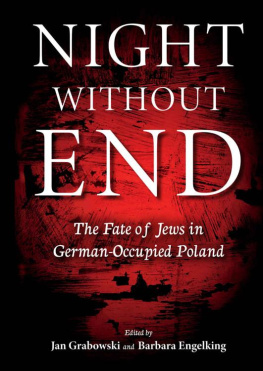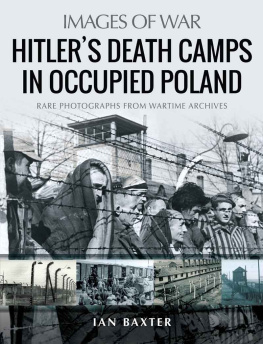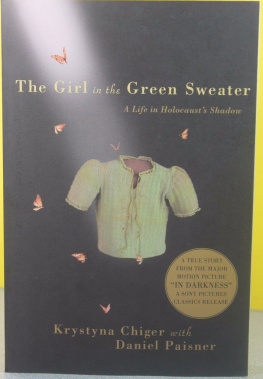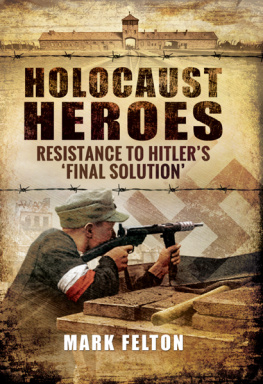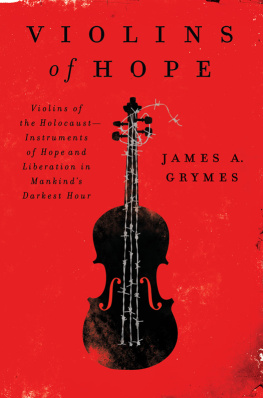In the Sewers of LVOV
The Last Sanctuary from the Holocaust
Robert Marshall

Dedicated to the memory of Leopold Socha
Contents

Some time during the early 1970s an elderly Polish Jew, Jacob Berestycki was his name, wrote to his friend Ignacy Chiger about their experiences together during the war.
Chiger, he wrote, you were the one with the pen in his hand. Write it all down.
The two men had met towards the end of 1942, in the Jewish ghetto of what was then the Polish city of Lvov. They later became members of a small group who survived the Holocaust in some of the most desperate conditions imaginable. In the thirty years since their liberation, no one had spoken in detail about what had happened and a number of people had begun to wonder whether their story would ever be told.
Only Berestycki and Chiger knew the whole story from beginning to end, and they felt that if one of them didnt set it down it might be lost. For thirty years Chiger had made notes about what had happened, but had resisted attempting a complete account. He had struggled with a conflict familiar to many survivors of the great Jewish tragedy; trying to satisfy the need to describe what had happened, while at the same time not wanting to disturb memories that had been laid to rest. According to his daughter Kristine, Chigers path through this conflict had been slow and painful, made more difficult by other responsibilities.
In the midst of their ordeal, Chiger had become the leader of their group and as such he felt that his account should speak for all. They had lived together under the most appalling conditions, been forced to share the most intimate aspects of their lives and in the months together witnessed both the worst and the very best of each other. Would history be served by describing everything?
By 1975 Chiger had conquered his doubts. His daughter presented him with a Polish typewriter and he began. With typical thoroughness he began with the events, as he recalled them, of 1 September 1939 and concluded with the days immediately following their liberation. It is an account of one of the most remarkable episodes of survival from the Jewish Holocaust. Six months after his work was finished Ignacy Chiger died.
In 1988, while making a documentary about this episode for the BBC series Timewatch, I met Chigers daughter Kristine Keren and his widow Paulina. Along with Mundek and Klara Margulies, they are the last surviving members of Chigers group able to bear witness. (A fifth survivor, Genia Weinberg, has for some years now been too unwell to recall any of what happened.) Some months after our work was finished, Mrs Keren told me about her fathers manuscript and asked if I would write a book based upon it. When I saw the Chiger manuscript I realized that it was not a complete account, but a record of Chigers own personal recollection. In that respect, it appears to be an accurate record, for, like memory itself, it reveals a great deal of detail in some parts, while elsewhere it conflates separate incidents and abbreviates others. However, it has one invaluable quality: it is extremely subjective. It was written in isolation, without reference to any of the other survivors recollections. Nor, so far as I can tell, has it influenced the recollections of those who have survived Chiger. Even after fifteen years, his widow Paulina Chiger has still not read the manuscript.
That element of isolation prevailed amongst all the survivors. Though they have always remained close to one another, they never discussed their common wartime experiences. The subject never seemed to arise. Consequently, their private recollections, like Chigers, remained uncontaminated. So, with five separate, highly subjective surviving versions, I set about trying to see if it would be possible to produce an account that would be faithful to all.
I have also interviewed a number of secondary sources, that is to say, the children of those members of the group who are not alive today. Their accounts are really inheritances, passed down from their parents, though cherished and indeed nourished nevertheless. As I gathered more material I expected to encounter contradictions. In the event, I was surprised at how many of the accounts tended to compliment each other, sometimes allowing me five separate perspectives of the same incident. (There were only a few contradictions and in each case I have presented the reader with all versions.) So the following is almost entirely based upon personal account. It has been built up from countless hours of interviews and recorded conversations, during which we often returned to the same incident five or six times.
Throughout all the interviews I made with the survivors I was conscious of the manner in which they were delivered. Told without inhibition, and often containing long passages of dialogue conversations, discussions, arguments acted out like a dramatic saga. I have drawn heavily upon this dialogue; it may not always have been what was actually said, but it is precisely how it was remembered.
If you stand upon the hill that rises above the city of Lvov and watch as the evening sun sets on the roofs, you might easily believe for a moment that you were somewhere else. You find spread before you an Italianate jumble of terracotta roofs, interrupted by the occasional thicket of trees or the bald dome of a church. Rising from the layers of mist the towers and spires etched in the evening light proclaim the citys heart to be in western Europe. It might be Florence.
Down below, there are districts of narrow cobbled lanes that curve and twist round the footings of medieval churches. Buildings lean out from their foundations, frowning over the pavements and the incessant clatter of pedestrians on the cobbles. Suddenly these precious little windings turn and spill into wide cosmopolitan boulevards. A walk down the Teodor Platz, or through the municipal gardens towards the opera house, evokes images of Paris or Berlin. The red and white trams jangling down the streets conjure an image of Vienna. The town hall, a stark piece of nineteenth-century utilitarianism, stands in the centre of a large piazza, embraced by a girdle of market traders and statues of classical Rome.
Given its physical bearing, a curious mixture of the Mediterranean and Germanic, of the romantic and the classical, Lvov is something of an anomaly today, standing as it does on the western fringes of the Soviet empire. For most of its history it was a Polish city, nestled in an area largely populated by Ukrainian peasants. It was a city of Poles, Jews and Ukrainians, the eastern outpost of the Austro-Hungarian empire, and had been for hundreds of years a centre of western culture and commerce on the edge of the Russian Steppes. In those days, its official name was Lemberg; only the Ukrainians called it Lvov. Today, the Poles are an aging minority, the Jews have all but disappeared and the city is dominated by Russians and Ukrainians.
By the evening, when the narrow streets have been cooled in long shadows, the market traders have folded up their stalls, swept their rubbish and gone, the sound of running water can be heard, cleansing the streets of debris. In the empty piazza, when the tram cars are silent, again the sound of water trickling from the fountains at either end; Diana amidst the flowers, Neptune with his trident. The sounds seem to drift up towards the hill that rises behind the square and eventually towers over the city.



